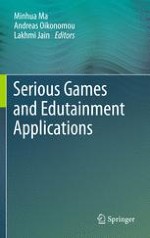2011 | OriginalPaper | Buchkapitel
10. Operation ARIES!: A Serious Game for Teaching Scientific Inquiry
verfasst von : Keith Millis, Carol Forsyth, Heather Butler, Patty Wallace, Arthur Graesser, Diane Halpern
Erschienen in: Serious Games and Edutainment Applications
Verlag: Springer London
Aktivieren Sie unsere intelligente Suche, um passende Fachinhalte oder Patente zu finden.
Wählen Sie Textabschnitte aus um mit Künstlicher Intelligenz passenden Patente zu finden. powered by
Markieren Sie Textabschnitte, um KI-gestützt weitere passende Inhalte zu finden. powered by
